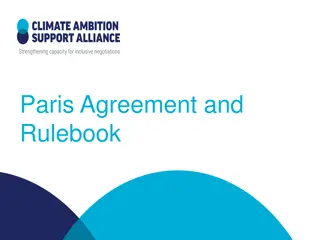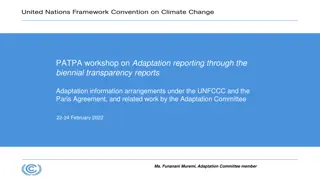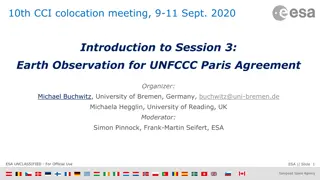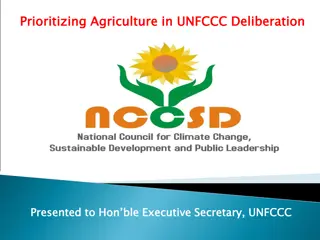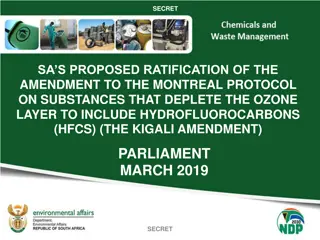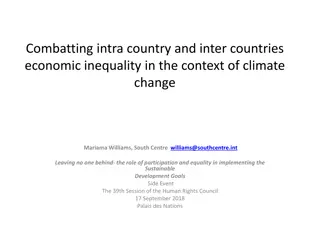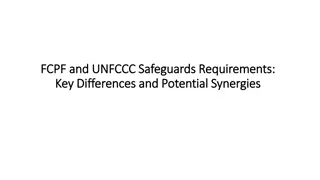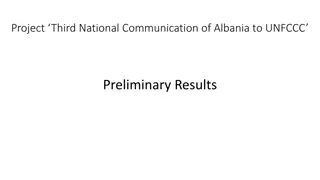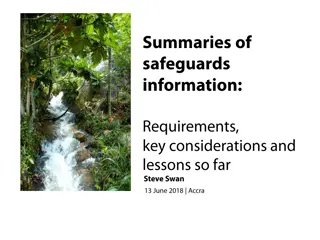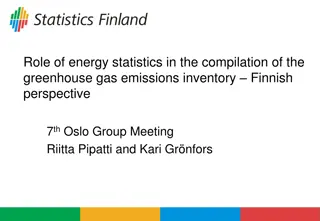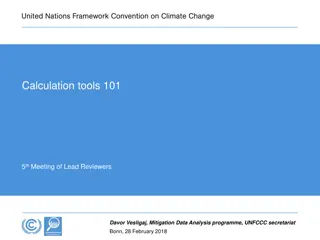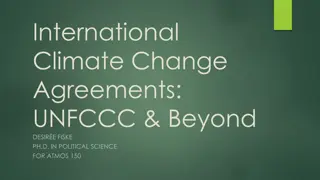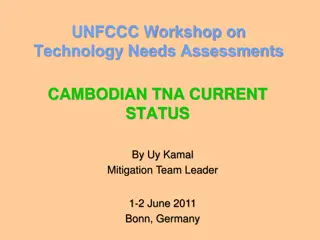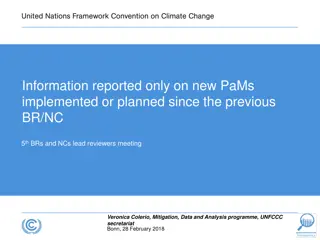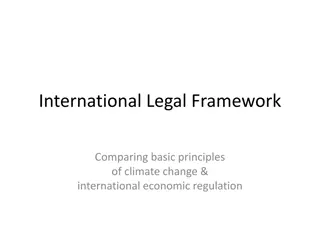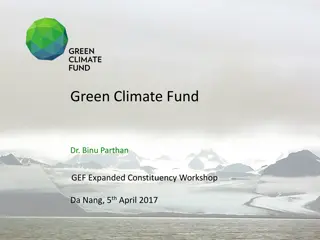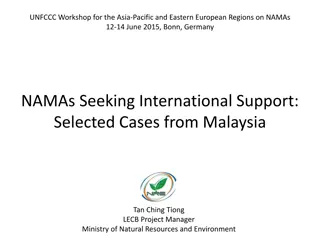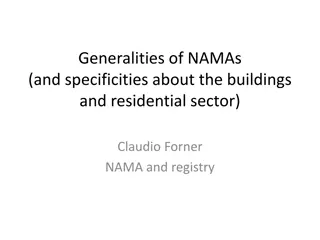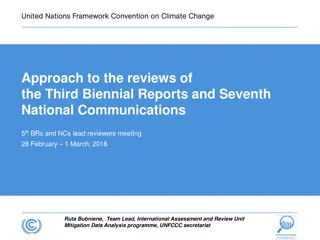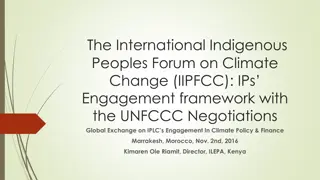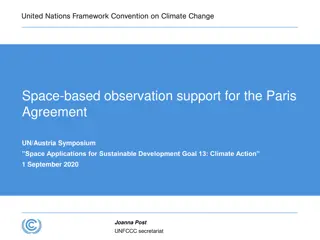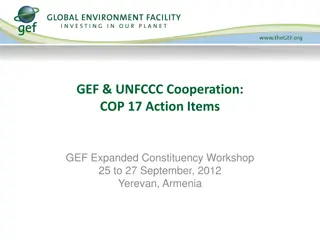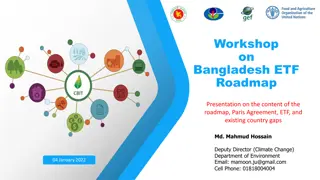Understanding International Climate Agreements and Governance
Delve into the intricacies of global climate governance with a focus on the Paris Agreement, UNFCCC history, key commitments, and the Kyoto Protocol. Explore the evolution of international fora and the concerted efforts to address climate change through mitigation, adaptation, and cooperation.
0 views • 73 slides
Workshop on Adaptation Reporting under the UNFCCC and Paris Agreement
Workshop on Adaptation Reporting through the Biennial Transparency Reports and related work by the Adaptation Committee under the UNFCCC and the Paris Agreement, focusing on arrangements for reporting and communicating adaptation information. The workshop covers various initiatives, guidelines, and
0 views • 7 slides
Earth Observation for UNFCCC Paris Agreement Meeting
Introduction to Session 3 of the 10th CCI Colocation Meeting on Earth Observation for UNFCCC Paris Agreement. The session covers presentations, breakout sessions, and discussions on how Earth Observation can support the implementation of the Paris Agreement through case studies and future research d
2 views • 7 slides
Enhancing CO2 Absorption Through Prioritizing Agriculture in UNFCCC Deliberation
COP 24 aims to address the challenges of global warming but faces obstacles in reducing CO2/GHG emissions. Emphasizing agriculture as a key solution due to its CO2 absorption capabilities can lead to breakthroughs. Implementing measures like modern technology in agriculture and promoting initiatives
1 views • 12 slides
Proposed Ratification of the Kigali Amendment to the Montreal Protocol
South Africa seeks Parliament's approval to ratify the Kigali Amendment to the Montreal Protocol, targeting the phase-down of hydrofluorocarbons (HFCs) to protect the ozone layer. The amendment requires new reporting on HFC production, imports, and exports, with different baselines for developing co
0 views • 10 slides
Addressing Economic Inequality in the Face of Climate Change Challenges
This discussion highlights the complex issue of economic inequality within and between countries in the context of climate change. It emphasizes the importance of inclusive participation and equality in achieving the Sustainable Development Goals. Various dimensions of inequality, including economic
0 views • 23 slides
Safeguard Requirements in REDD+ Implementation: UNFCCC and FCPF Perspectives
Safeguard requirements in REDD+ projects involve various approaches and processes from entities like bilateral donors, the Green Climate Fund, project-level standards, and more. The challenge lies in integrating these multiple requirements into a coherent national approach to ensure efficiency and r
0 views • 12 slides
Albanian National Communication on Climate Change: Preliminary Results and Projections
The Albanian National Communication to the UNFCCC presents preliminary results on greenhouse gas emissions from various sectors such as energy, transport, agriculture, and waste between 2000-2009. It also outlines the expected changes in temperature, precipitation, and sea level rise, along with int
0 views • 7 slides
Requirements and Progress in REDD+ Implementation
Understand UNFCCC and GCF requirements for REDD+ implementation, including the need for national communications and summaries of information. Learn about the structure of summaries, safeguard considerations, eligibility criteria, and lessons from past experiences in developing summaries.
0 views • 9 slides
Climate Change Monitoring, Reporting, and Verification (MRV) Training Session Overview
This document outlines the purpose and reporting requirements for the development of a Climate Change Monitoring, Reporting, and Verification (MRV) system, focusing on projections and scenarios. It highlights the importance of collecting information for climate mitigation, assisting Serbia in meetin
0 views • 19 slides
The Role of Energy Statistics in Greenhouse Gas Emissions Inventory - Finnish Perspective
Highlighting Finland's national greenhouse gas inventory system guided by the UNFCCC and Kyoto Protocol requirements. Emphasis on the significance of energy statistics in compiling accurate emissions data, ensuring transparency, collaboration with key entities, and adherence to reporting guidelines
0 views • 11 slides
Climate Change and Development in Africa: A Journey from Kyoto to Paris
The journey of climate change negotiations in Africa, from key milestones in the climate change regime to the role of African institutions and bodies, such as the African Union and African Ministerial Conference on the Environment. Highlights include the entry into force of the UNFCCC, the adoption
1 views • 15 slides
Overview of Calculation Tools for Mitigation Data Analysis Program under UNFCCC Secretariat
This content discusses various calculation tools used in the Mitigation Data Analysis program of the UNFCCC Secretariat. It includes tools for GHG projections, financial support, and their integration into Country briefs to facilitate accurate data presentation and reduce workload during reviews. De
0 views • 7 slides
Global Efforts and Challenges in Climate Change Agreements
Explore the evolution of international climate change agreements, from the birth of UNFCCC to the success of the Montreal Protocol. Analyze key questions on actor involvement, policy advising, societal needs reconciliation, and scientific knowledge application. Delve into the UN's role, civil societ
0 views • 17 slides
Climate Change Technology Needs Assessment Workshop in Cambodia
The UNFCCC Workshop on Technology Needs Assessments in Cambodia focused on organizing for TNA, identifying development priorities related to climate change, and utilizing technology analysis and prioritization tools. The workshop highlighted the importance of national coordination, institutional str
0 views • 19 slides
Reviewing Practices for New Policies and Measures Implementation in Climate Change Reporting
The report focuses on the review approaches for assessing information solely on new policies and measures (PaMs) implemented or planned since the previous review meetings in relation to climate change mitigation actions. It highlights the importance of transparent reporting of PaMs to achieve econom
0 views • 10 slides
International Legal Framework and Climate Change Challenges
The international legal framework for addressing climate change, including the UN Framework Convention on Climate Change (UNFCCC) and the Kyoto Protocol, aims to mitigate greenhouse gas emissions and promote adaptation measures. Despite efforts, progress has been slow with challenges in meeting targ
0 views • 60 slides
Overview of Green Climate Fund Initiatives
The Green Climate Fund (GCF) is a key financial mechanism under the UNFCCC and the Paris Agreement, with a portfolio comprising 35 projects/programs funded at USD 1.5 billion. It aims to address climate change through various sectors like energy access, transport, forestry, livelihoods, health, infr
0 views • 14 slides
NAMA Development and International Support in Malaysia
The UNFCCC Workshop in Bonn discussed NAMAs in Malaysia, focusing on national frameworks, prioritization, sectoral assessments, and international support. Various NAMA projects were highlighted, including peat swamp forest management, e-waste management, electric mobility, CDM projects, and low carb
0 views • 15 slides
Overview of NAMAs in the Buildings and Residential Sector
This presentation delves into the specifics of NAMAs (Nationally Appropriate Mitigation Actions) within the context of the buildings and residential sector. It covers the origins and evolution of NAMAs, negotiations under the UNFCCC, and the implementation actions related to NAMAs. The content also
0 views • 23 slides
Challenges and Milestones in Reviewing Biennial Reports and National Communications in the UNFCCC Process
Reviews of Third Biennial Reports and Seventh National Communications face challenges in securing supplementary resources, timely submission, and sustaining a pool of qualified experts. The UNFCCC secretariat is coordinating 44 reviews in the 2018-2019 cycle, with 22 reviews dependent on additional
0 views • 13 slides
International Indigenous Peoples Forum on Climate Change (IIPFCC) Engagement Framework
The IIPFCC is a platform where indigenous peoples globally come together during UNFCCC negotiations to voice their concerns and shape outcomes. The forum provides a safe space for consensus-building on shared issues. Co-chaired by representatives from different regional groupings, the IIPFCC operate
0 views • 14 slides
Importance of Space-based Observation for Climate Action & the Paris Agreement
Utilizing space-based observation data is crucial for supporting the Paris Agreement and achieving sustainable development goals related to climate action. Observations play a key role in formulating commitments, assessing policies, and conducting research for combating climate change, as outlined i
0 views • 12 slides
Overview of GEF-UNFCCC Cooperation and COP 17 Action Items
GEF, as an Operating Entity of the UNFCCC, plays a crucial role in supporting non-Annex I Parties in various climate change initiatives. The COP 17 decisions relevant to GEF include long-term cooperative actions, technology mechanisms, and the Green Climate Fund. GEF is tasked with providing support
0 views • 13 slides
Bangladesh ETF Roadmap Presentation on Paris Agreement and Country Gaps
The workshop on Bangladesh ETF roadmap delves into the country's national circumstances, climate policies, and UNFCCC reporting obligations. It outlines gaps in the national GHG inventory, monitoring, reporting, and NDC updates. The roadmap emphasizes transitioning to ETF, BTR readiness, and enhanci
0 views • 13 slides
